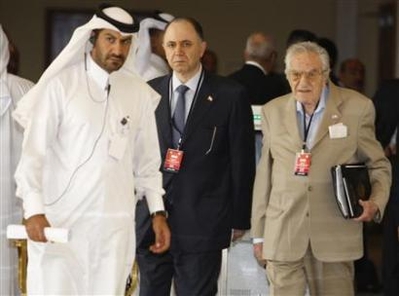 DOHA – Arab mediators gave Lebanon’s opposition a Wednesday deadline to respond to proposals aimed at resolving a political crisis which brought the country to the brink of civil war. Delegates said the proposals called for the immediate election of a president, a cabinet in which the opposition had veto powers, a pledge to avoid violence (In which the ruling coalition and opposition has already agreed), and two alternative solutions to the election law impasse. The only disagreement is the electoral law. The new proposal suggested by Qatar are mainly in regards of the division of Beirut. The division of Beirut into three subscriptions as followed 7, 7, 5 and /or the second proposal is to discuss Boutros proposal during their return in the Lebanese parliament. Qatars minister of state for foreign affairs Ahmad Abdullah al-Mahmood said the mediators had put forward two proposals to break the deadlock between the U.S.-supported ruling coalition and the opposition. "One of the sides asked for one extra day to respond to these proposals … and the committee agreed to give a one day deadline till tomorrow," Mahmood told reporters on Tuesday. General Aoun in a personnal interview with New TV has confirmed that he has offered as much as he could in regards of the overall plan. He has added that it is the right of the voters in Beirut to have each circomscription divided in a fair manner which is following the 1960 law division of Beirut. He has also reminded that he decided to support General Sleiman and decided not to run for presidency eventhough he has the support of the overwhelming numbers of Lebanese chrisitians and is the head of the biggest Christian coalition in the Lebanese Parliament. By supporting General Sleiman he had already backed up a lot of his demands and cannot continue backing up without having the ruling coalition takes its responsability and divide Beirut circumscription in a fair way as he has stated.
DOHA – Arab mediators gave Lebanon’s opposition a Wednesday deadline to respond to proposals aimed at resolving a political crisis which brought the country to the brink of civil war. Delegates said the proposals called for the immediate election of a president, a cabinet in which the opposition had veto powers, a pledge to avoid violence (In which the ruling coalition and opposition has already agreed), and two alternative solutions to the election law impasse. The only disagreement is the electoral law. The new proposal suggested by Qatar are mainly in regards of the division of Beirut. The division of Beirut into three subscriptions as followed 7, 7, 5 and /or the second proposal is to discuss Boutros proposal during their return in the Lebanese parliament. Qatars minister of state for foreign affairs Ahmad Abdullah al-Mahmood said the mediators had put forward two proposals to break the deadlock between the U.S.-supported ruling coalition and the opposition. "One of the sides asked for one extra day to respond to these proposals … and the committee agreed to give a one day deadline till tomorrow," Mahmood told reporters on Tuesday. General Aoun in a personnal interview with New TV has confirmed that he has offered as much as he could in regards of the overall plan. He has added that it is the right of the voters in Beirut to have each circomscription divided in a fair manner which is following the 1960 law division of Beirut. He has also reminded that he decided to support General Sleiman and decided not to run for presidency eventhough he has the support of the overwhelming numbers of Lebanese chrisitians and is the head of the biggest Christian coalition in the Lebanese Parliament. By supporting General Sleiman he had already backed up a lot of his demands and cannot continue backing up without having the ruling coalition takes its responsability and divide Beirut circumscription in a fair way as he has stated.
Delegates in Qatar said the governing coalition accepted both proposals to overcome disagreements on sharing power in a national unity government and changes to an election law. "We are not the party that asked for the postponement," government minister Ahmed Fatfat told Al Jazeera television. Qatar’s Prime Minister Sheikh Hamad bin Jassim bin Jabr al-Thani spoke by telephone with officials in Iran and Syria, Agreement on the election law and power sharing in cabinet — where the opposition has demanded a veto — would pave the way for parliament to elect army chief General Michel Suleiman as president, a post that has been vacant since November. The rivals were at a deadlock on Monday over the electoral division of Beirut — the bedrock of support for Saad al-Hariri, The division of electoral constituencies will help shape the outcome of parliamentary polls in 2009. Analysts said the Qatari-led Arab mediators still held out hopes of success, but that their 24-hour deadline might simply be postponing failure. "It seems the Arab committee sees itself halfway between both," political columnist Abdel Wahab Badrakhan said. "For the first time in the conference the opposition finds itself cornered and having to respond clearly."



